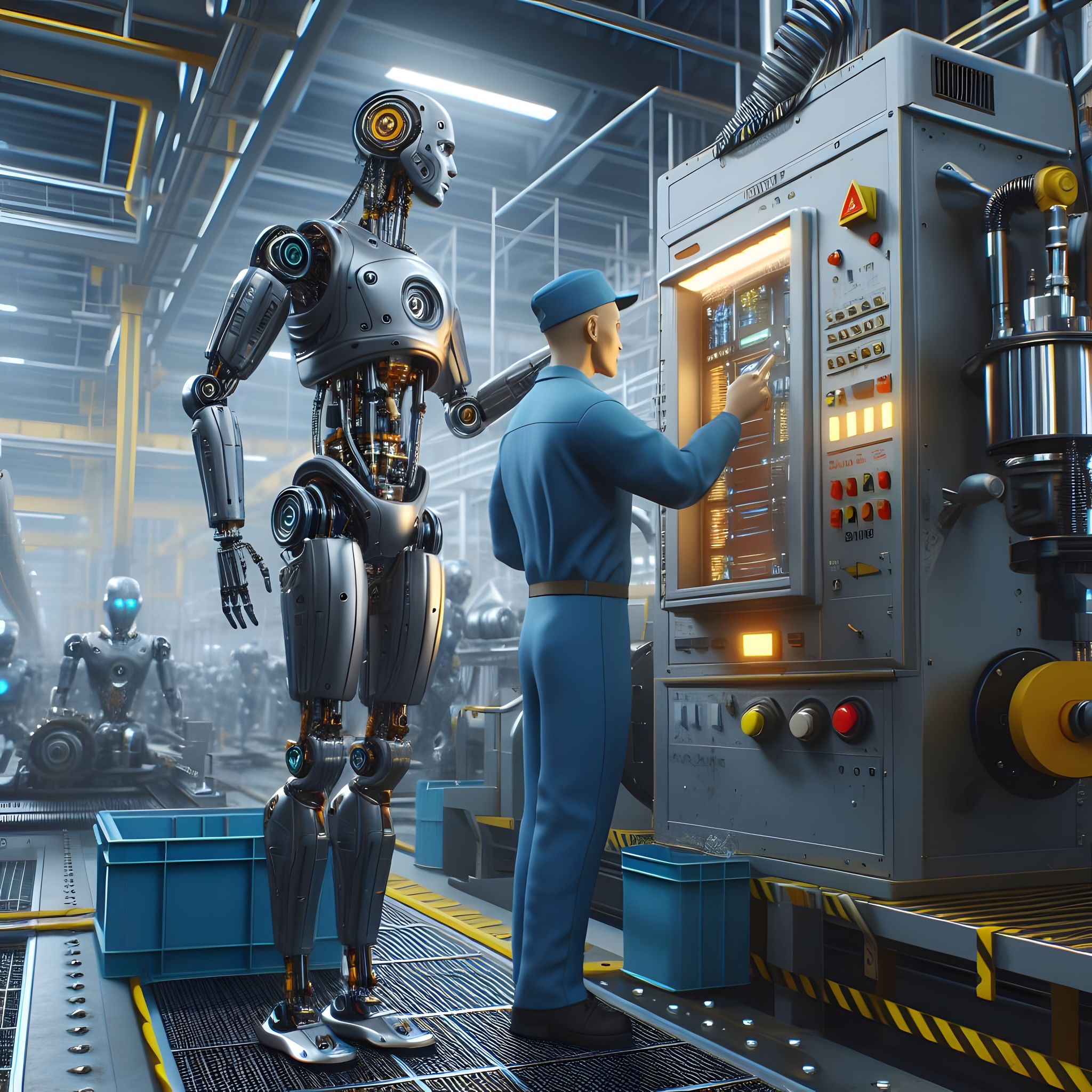AI in Industries is Transforming the Landscape
AI in industries has become a buzzword in recent years, with its potential to transform various sectors and revolutionize the way we work and live. Artificial Intelligence (AI) has captured the attention of businesses, researchers, and policymakers alike, as it promises to bring about significant changes in the way industries operate. As AI continues to advance at a rapid pace, it is crucial to examine the latest trends and understand how AI in industries is shaping the future.
The impact of AI is far-reaching, with applications spanning across diverse fields such as healthcare, finance, manufacturing, and retail. In this article, we will delve into the impact of AI in industries, exploring the benefits, challenges, and opportunities that come with the adoption of this groundbreaking technology. From improving efficiency and accuracy to enabling new business models and enhancing customer experiences, AI in industries is making its presence felt across the board, driving innovation and transforming the way we work and live. As we navigate this new era of AI-driven change, it is essential to understand the implications and prepare for the future that lies ahead.
We strongly recommend that you check out our guide on how to take advantage of AI in today’s passive income economy.
Table of Contents
The Rise of AI in Industries
The rise of AI in industries can be attributed to several factors, including the availability of vast amounts of data, the increasing computing power, and the advancements in machine learning algorithms. As businesses recognize the potential of AI to streamline operations, improve decision-making, and enhance customer experiences, the adoption of AI in industries has gained significant momentum. According to a report by PwC, AI could contribute up to $15.7 trillion to the global economy by 2030, highlighting the immense potential of this technology. As AI in industries continues to evolve, it is essential for businesses to stay informed about the latest trends and adapt to the changing landscape.
AI in Healthcare: Transforming Patient Care
One of the most promising applications of AI in industries is in the healthcare sector. AI-powered tools and systems are revolutionizing patient care, from early disease detection and diagnosis to personalized treatment plans and drug discovery. For instance, AI algorithms can analyze medical images, such as X-rays and MRIs, to identify abnormalities and assist radiologists in making accurate diagnoses. Moreover, AI in industries like healthcare can help predict patient outcomes, enabling healthcare providers to intervene early and improve patient care. With the ability to process vast amounts of medical data, AI in industries is paving the way for precision medicine, where treatments are tailored to individual patient needs.
AI in Finance: Enhancing Financial Services
The financial industry is another sector where AI in industries is making significant strides. AI-powered tools are transforming the way financial institutions operate, from fraud detection and risk assessment to customer service and investment management. By analyzing vast amounts of financial data, AI algorithms can identify patterns and anomalies, helping financial institutions detect and prevent fraudulent activities. Additionally, AI in industries like finance can provide personalized investment recommendations based on an individual’s risk profile and financial goals. Chatbots powered by AI are also revolutionizing customer service in the financial industry, providing instant assistance and support to customers 24/7.
AI in Manufacturing: Optimizing Production Processes
AI in industries is also transforming the manufacturing sector, enabling companies to optimize production processes, reduce costs, and improve quality control. By leveraging AI-powered tools and systems, manufacturers can monitor and analyze production lines in real-time, identifying potential issues and inefficiencies. Predictive maintenance, powered by AI algorithms, can help manufacturers anticipate equipment failures and schedule maintenance proactively, minimizing downtime and reducing maintenance costs. Moreover, AI in industries like manufacturing can enable the creation of smart factories, where machines and systems communicate and collaborate seamlessly, optimizing production processes and improving overall efficiency.
AI in Retail: Personalizing the Shopping Experience
The retail industry is another sector where AI in industries is making a significant impact. AI-powered tools and systems are transforming the way retailers engage with customers, from personalized product recommendations to enhanced customer service. By analyzing customer data, such as purchase history and browsing behavior, AI algorithms can provide tailored product recommendations, increasing customer satisfaction and loyalty. Additionally, AI-powered chatbots are revolutionizing customer service in the retail industry, providing instant assistance and support to customers, even outside regular business hours. AI in industries like retail is also enabling the creation of smart stores, where cameras and sensors track customer behavior and optimize store layouts and product placement.
Challenges and Considerations
While AI in industries offers immense potential, it is essential to acknowledge the challenges and considerations that come with the adoption of this technology. One of the primary concerns is the potential impact on employment, as AI automation may displace certain jobs.
However, it is crucial to recognize that AI in industries is also creating new job opportunities, particularly in the fields of AI development, data analysis, and AI ethics. Another consideration is the need for responsible AI development and deployment, ensuring that AI systems are transparent, accountable, and free from bias. As AI in industries continues to evolve, it is essential for businesses and policymakers to address these challenges and ensure that the benefits of AI are harnessed while mitigating potential risks.
Conclusion
In conclusion, AI in industries is transforming the way we work and live, driving innovation and efficiency across various sectors. From healthcare and finance to manufacturing and retail, AI-powered tools and systems are revolutionizing operations, improving decision-making, and enhancing customer experiences.
As AI in industries continues to advance, it is crucial for businesses to stay informed about the latest trends and adapt to the changing landscape. While there are challenges and considerations to address, the potential of AI in industries is immense, and its impact will only continue to grow in the coming years. By embracing AI in industries responsibly and strategically, businesses can unlock new opportunities, drive growth, and shape a better future for all.
FAQ
How is AI used in industry?
AI is used in various ways across different industries. Some common applications include:
- Automating repetitive tasks and processes
- Analyzing large amounts of data to gain insights and make predictions
- Enhancing decision-making through machine learning algorithms
- Improving customer experiences through personalization and chatbots
- Optimizing supply chain management and logistics
- Enabling predictive maintenance of equipment and machinery
How has AI impacted industries?
AI has had a significant impact on industries, transforming the way businesses operate and compete. Some of the key impacts include:
- Increased efficiency and productivity through automation
- Improved accuracy and reduced errors in tasks such as quality control and fraud detection
- Enhanced customer experiences through personalized recommendations and 24/7 support
- New business models and revenue streams enabled by AI-powered products and services
- Competitive advantage for early adopters and innovators in AI integration
How AI is changing the industry?
AI is changing industries in profound ways, disrupting traditional business models and creating new opportunities. Some of the major changes include:
- Shift towards data-driven decision-making and predictive analytics
- Transformation of workforce roles and skills, with a focus on AI collaboration
- Increased automation of manual and repetitive tasks, freeing up human resources for higher-value work
- Emergence of new AI-powered products, services, and business models
- Greater emphasis on AI ethics, transparency, and responsible deployment
What is industrial AI?
Industrial AI refers to the application of artificial intelligence technologies in industrial settings, such as manufacturing, energy, and transportation. It involves the use of AI algorithms, machine learning, and data analytics to optimize processes, improve efficiency, and enhance decision-making in industrial operations. Some examples of industrial AI include:
- Predictive maintenance of equipment and machinery
- Optimization of production processes and supply chain management
- Quality control and anomaly detection in manufacturing
- Energy management and predictive demand forecasting
- Autonomous vehicles and intelligent transportation systems
Which jobs will AI replace?
AI has the potential to automate certain jobs, particularly those that involve repetitive, routine, or predictable tasks. Some examples of jobs that may be at risk of replacement by AI include:
- Data entry and administrative roles
- Assembly line and manufacturing positions
- Customer service and support roles
- Certain aspects of accounting and financial analysis
- Routine legal and medical tasks
However, it’s important to note that AI is also expected to create new job opportunities, particularly in fields such as AI development, data analysis, and AI ethics.
What is the benefit of AI in industry?
The benefits of AI in industry are numerous and wide-ranging. Some of the key advantages include:
- Increased efficiency and productivity through automation and optimization
- Improved accuracy and reduced errors in complex tasks
- Enhanced decision-making through data-driven insights and predictive analytics
- Personalized and improved customer experiences
- Cost savings through optimized resource allocation and reduced waste
- Competitive advantage and new business opportunities enabled by AI innovation
- Freeing up human resources for higher-value, creative, and strategic work
By leveraging the power of AI, industries can streamline operations, drive innovation, and unlock new levels of growth and success in an increasingly competitive landscape.

We strongly recommend that you check out our guide on how to take advantage of AI in today’s passive income economy.




